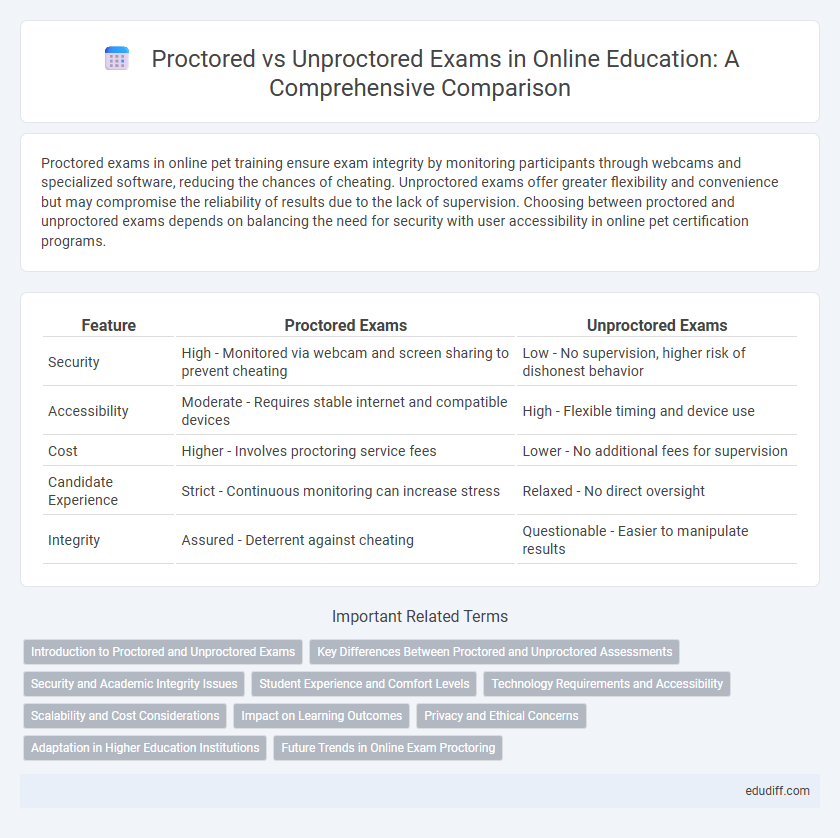Proctored exams in online pet training ensure exam integrity by monitoring participants through webcams and specialized software, reducing the chances of cheating. Unproctored exams offer greater flexibility and convenience but may compromise the reliability of results due to the lack of supervision. Choosing between proctored and unproctored exams depends on balancing the need for security with user accessibility in online pet certification programs.
Table of Comparison
| Feature | Proctored Exams | Unproctored Exams |
|---|---|---|
| Security | High - Monitored via webcam and screen sharing to prevent cheating | Low - No supervision, higher risk of dishonest behavior |
| Accessibility | Moderate - Requires stable internet and compatible devices | High - Flexible timing and device use |
| Cost | Higher - Involves proctoring service fees | Lower - No additional fees for supervision |
| Candidate Experience | Strict - Continuous monitoring can increase stress | Relaxed - No direct oversight |
| Integrity | Assured - Deterrent against cheating | Questionable - Easier to manipulate results |
Introduction to Proctored and Unproctored Exams
Proctored exams are supervised assessments that use live or AI monitoring to ensure academic integrity by preventing cheating and unauthorized access. Unproctored exams allow students to complete tests independently without real-time supervision, relying on honor codes or automated plagiarism detection. The choice between proctored and unproctored exams impacts test security, user experience, and scalability in online education platforms.
Key Differences Between Proctored and Unproctored Assessments
Proctored exams involve real-time supervision through video monitoring or specialized software to ensure exam integrity, while unproctored exams lack such oversight, relying on the honor system. Key differences include the level of cheating prevention, with proctored exams offering higher security and credibility compared to unproctored tests. Additionally, proctored assessments often require secure browser environments and identity verification, whereas unproctored exams provide greater flexibility but may compromise reliability.
Security and Academic Integrity Issues
Proctored exams significantly enhance security by monitoring test-takers through live or AI-based surveillance, reducing the risk of cheating and identity fraud. Unproctored exams lack real-time supervision, making them vulnerable to academic dishonesty such as unauthorized collaboration and use of external resources. Ensuring academic integrity in unproctored settings requires advanced authentication methods and robust honor code enforcement.
Student Experience and Comfort Levels
Proctored exams enhance academic integrity but may increase student anxiety due to strict monitoring and technical requirements, potentially impacting their focus and comfort. Unproctored exams offer a relaxed environment that supports natural test-taking behavior and reduces stress but can raise concerns about cheating and result validity. Balancing secure assessment methods with student comfort is essential to optimize performance and fairness in online education.
Technology Requirements and Accessibility
Proctored exams demand advanced technology, including webcams, stable internet connections, and specialized software to monitor test-takers in real-time, ensuring exam integrity. Unproctored exams generally require minimal technological resources, enhancing accessibility for individuals with limited internet bandwidth or older devices. The disparity in technology requirements significantly impacts candidate accessibility, balancing security needs against broad participation opportunities.
Scalability and Cost Considerations
Proctored exams require significant investment in monitoring technology and personnel, increasing operational costs and limiting scalability for large-scale testing environments. Unproctored exams offer greater scalability by eliminating the need for supervision, enabling institutions to administer assessments to vast numbers of candidates simultaneously at a lower cost. However, this cost efficiency often comes at the expense of exam security and integrity.
Impact on Learning Outcomes
Proctored exams enhance learning outcomes by minimizing cheating and ensuring academic integrity, resulting in more accurate assessment of student knowledge and skills. Unproctored exams often lead to inflated scores and reduced motivation to study, which can undermine genuine learning and skill development. Reliable evaluation through proctored assessments promotes better retention and critical thinking essential for long-term educational success.
Privacy and Ethical Concerns
Proctored exams raise significant privacy concerns due to continuous monitoring, video recording, and data collection, which can intrude on personal spaces and lead to potential misuse of sensitive information. Unproctored exams reduce surveillance but increase risks of academic dishonesty, posing ethical challenges regarding test integrity and fairness. Balancing privacy rights with the need for secure evaluations is critical in developing ethical online assessment policies.
Adaptation in Higher Education Institutions
Higher education institutions are increasingly adapting to proctored exams to ensure academic integrity in online learning environments, utilizing advanced AI-based monitoring and real-time identity verification technologies. Unproctored exams, while offering flexibility and accessibility, present challenges such as increased risk of academic dishonesty and reduced reliability in assessing student performance. The integration of secure proctoring solutions enables institutions to maintain rigorous assessment standards while accommodating remote learners.
Future Trends in Online Exam Proctoring
Advancements in AI-driven monitoring and biometric authentication are shaping the future of online exam proctoring, enhancing security and reducing instances of cheating in proctored exams. Unproctored exams may incorporate adaptive algorithms to better assess integrity while providing greater flexibility and privacy for test-takers. The integration of blockchain for immutable exam records and real-time analytics will further transform the landscape of online assessments, ensuring transparency and trust.
Proctored exams vs Unproctored exams Infographic

 edudiff.com
edudiff.com